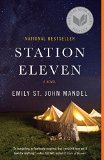Reading Guide Questions

Please be aware that this discussion guide will contain spoilers!
- Now that you've read the entire novel, go back and reread the passage by Czeslaw Milosz that serves as an epigraph. What does it mean? Why did Mandel choose it to introduce Station Eleven?
- Does the novel have a main character? Who would you consider it to be?
- Arthur Leander dies while performing King Lear, and the Traveling Symphony performs Shakespeare's works. On page 57, Mandel writes, "Shakespeare was the third born to his parents, but the first to survive infancy. Four of his siblings died young. His son, Hamnet, died at eleven and left behind a twin. Plague closed the theaters again and again, death flickering over the landscape." How do Shakespearean motifs coincide with those of Station Eleven, both the novel and the comic?
- Arthur's death happens to coincide with the arrival of the Georgia Flu. If Jeevan had been able to save him, it wouldn't have prevented the apocalypse. But how might the trajectory of the novel been different?
- What is the metaphor of the Station Eleven comic books? How does the Undersea connect to the events of the novel?
- "Survival is insufficient," a line from Star Trek: Voyager, is the Traveling Symphony's motto. What does it mean to them?
- On page 62, the prophet discusses death: "I'm not speaking of the tedious variations on physical death. There's the death of the body, and there's the death of the soul. I saw my mother die twice." Knowing who his mother was, what do you think he meant by that?
- Certain items turn up again and again, for instance the comic books and the paperweight—things Arthur gave away before he died, because he didn't want any more possessions. And Clark's Museum of Civilization turns what we think of as mundane belongings into totems worthy of study. What point is Mandel making?
- On a related note, some characters—like Clark—believe in preserving and teaching about the time before the flu. But in Kirsten's interview with François Diallo, we learn that there are entire towns that prefer not to: "We went to a place once where the children didn't know the world had ever been different . . . " (page 115). What are the benefits of remembering, and of not remembering?
- What do you think happened during the year Kirsten can't remember?
- In a letter to his childhood friend, Arthur writes that he's been thinking about a quote from Yeats, "Love is like the lion's tooth." (page 158). What does this mean, and why is he thinking about it?
- How does the impending publication of those letters affect Arthur?
- On page 206, Arthur remembers Miranda saying "I regret nothing," and uses that to deepen his understanding of Lear, "a man who regrets everything," as well as his own life. How do his regrets fit into the larger scope of the novel? Other than Miranda, are there other characters that refuse to regret?
- Throughout the novel, those who were alive during the time before the flu remember specific things about those days: the ease of electricity, the taste of an orange. In their place, what do you think you'd remember most?
- What do you imagine the Traveling Symphony will find when they reach the brightly lit town to the south?
- The novel ends with Clark, remembering the dinner party and imagining that somewhere in the world, ships are sailing. Why did Mandel choose to end the novel with him?
Unless otherwise stated, this discussion guide is reprinted with the permission of Vintage.
Any page references refer to a USA edition of the book, usually the trade paperback version, and may vary in other editions.

 Book Reviewed by:
Book Reviewed by:





